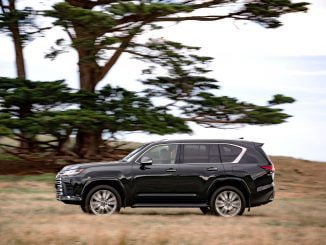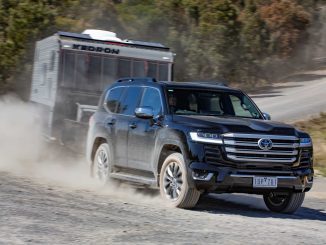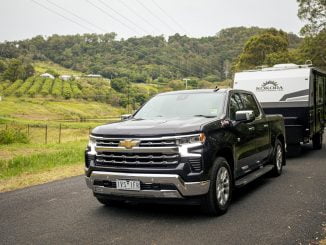Towing Tips – The great Australian dream for many is to travel around Australia. The army of Grey Nomads and an increasing number of younger travellers are out there each day driving or towing their RV fulfilling that dream.
 For some the dream turns into a nightmare. Accidents on the touring holiday are all too many and most could have been avoided with a little education, common sense and training in towing.
For some the dream turns into a nightmare. Accidents on the touring holiday are all too many and most could have been avoided with a little education, common sense and training in towing.
Towing a caravan or camper trailer can be a daunting experience for the novice. The entire dynamics of the vehicle handling, from starting through cornering to braking all change significantly when you are towing anything from a camper trailer to a 2500kg caravan and beyond.
Some of the caravans, especially the off road versions weigh enormous amounts and have high centres of gravity. Often the whole rig, vehicle and caravan is over 5 tonnes on the road and all being towed by someone that has had little or no experience in handling a rig that size.
Many are the times this writer has heard the driver saying, “Its ok I have towed trailers to the tip for years”. What happens next is usually one of the following.
The driver really doesn’t believe that he has the skills necessary, although their ego often wont allow them to admit it and so they travel with a constant worry about their rig and never fully get the most out of what they have. This is particularly so for off road camper trailers
• Often only one of a couple will drive which places a burden on the driver. One of the pleasures of the round Australia trip is sharing, including the driving
• The driver really doesn’t believe they have the skills and sometimes doesn’t go on the trip of the lifetime or worse still
• The driver actually believes that they have the skills to tow a 5tonne plus rig without any training and this is usually where accidents happen.
From personal experience the writer can tell you that
even with lots of experience towing and with driver training you can still get yourself in trouble. What the training allows you to do is have a better chance of getting out of trouble safely.
Let me enlighten you with an embarrassing experience.
We were driving into Windjana Gorge towing our caravan. The road up to the turn off had just been graded from Wyndham and was relatively smooth driving so we could maintain a reasonable pace.
When we turned to go into Windjana Gorge the road turned to heavy corrugations so we tried to maintain a pace that allowed us to avoid the most damaging effects of the corrugations. We came upon a dip in the road. The sign told us so. What the sign failed to tell us was that the dip was also a turn, off camber and heavily corrugated. We entered the turn going slowly but too fast for the conditions, not more than halfway into the turn we were in trouble and against all my experience and training I touched the brakes. Just for a millisecond, only the tiniest touch. I am talking the baby of all touches here.
But it was enough to change the dynamics and all of a sudden we were looking at our caravan at right angles to the tow vehicle going around an off cambered corrugated dip and turn in the road.
My kids just looked in stunned silence, I looked at my partner and said something profound like “this isn’t good” and immediately hit the accelerator to snap the van back in behind. The natural instinct would have been to brake even more and disaster would have struck. The van would have overtaken the car and probably rolled both resulting in an inglorious end to our trip. The van snapped back into line, we drove through the turn and no –one in the car said a word until we arrived at the camping area in the gorge.
I inspected the damage inside and we escaped with a mobile microwave only. It could have been much worse So, from personal experience, if you are planning that well earned and anticipated trip make sure you do your preparation. Education gives you the knowledge & skills to avoid problems and react appropriately if they happen.
As this is such an important topic MyRV Publications is going to run a series of articles which will cover everything from the correct way to pack your tow vehicle, vehicle dynamics, vehicle preparation, towing driving skills, different types of rigs etc.
To do this we have enlisted the help of the professionals at Tow-Ed. John and Julie Eggenhuizen run one of the countries premier towing education courses. We will also have help from other professionals on vehicle preparation etc as we go along.
For those looking to enhance their towing skills and safety, enrolling in a caravan towing course can be invaluable. These courses are designed to provide hands-on experience and expert guidance, ensuring you’re well-prepared for any towing situation
In addition to this we invite you the reader to write in with your questions and we will have the experts answer them for you. The guys at Tow-Ed have left us with a few tips on what to do and not to do to make your journey as safe and pleasurable as possible. Prepare your van & car, look at weight and just how much Stuff you plan to put in them, then look at all that stuff again and ask yourself Do you REALLY need all that? Make sure you are comfortable and confident towing the caravan. Have a few practice weekends to iron out any little issues (and also realize you don’t need all that Stuff!)
A few questions:
Do I need a special licence to tow a caravan
or trailer? No, you don’t need a special licence or even any towing experience. But towing a caravan requires skill and concentration. We recommend you learn from experienced trainers in towing
Can learner drivers and “P” drivers tow a
trailer or van? Provisional (“P” plate) licensed drivers are not permitted to tow another vehicle, or a trailer with an unladen mass of 250 kg or more. Learners are not permitted to tow a trailer, caravan or any another vehicle
Am I permitted to follow the same speed limits
when towing? Mostly, yes. However, though the national speed limit for towing combinations of less than 4.5 tonnes is the posted speed limit, some vehicle manufacturers apply a speed restriction to their vehicles under certain conditions. If these are ignored, your insurance and warranty may be waived. We recommend you travel at 90 km/h and under. It’s better safe than sorry.




Kent ..check out the good Sam website we talked about. Lots of forums on towing.I love living space of 5th wheels but the trade off Is security having to get into another vehicle if sudden move is required; hooking up; and the biggies..having to stop and pull over for someone to go potty or fix a sandwhich or coffee .and being limited to carrying only the amount of people/critters the towing vechicle can carry. Pulling over when you are 63 long much harder than 30.